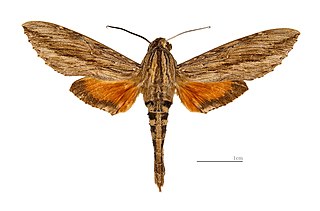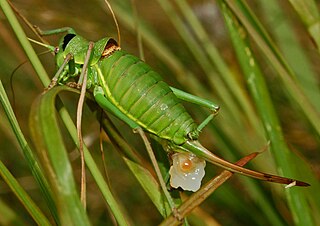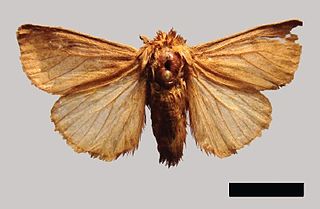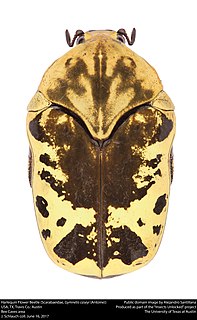
Flower chafers are a group of scarab beetles, comprising the subfamily Cetoniinae. Many species are diurnal and visit flowers for pollen and nectar, or to browse on the petals. Some species also feed on fruit. The group is also called fruit and flower chafers, flower beetles and flower scarabs. There are around 4,000 species, many of them still undescribed.

Rhombodera is a genus of praying mantises native to Asia and possessing common names such as shield mantis, hood mantis, and leaf mantis because of their extended, leaf-like thoraxes.
Paracles is a genus of moths in the subfamily Arctiinae. The genus was described by Francis Walker in 1855. The species range from Panama to Patagonia, with quite a few in the southern temperate region of South America.

Tessellota is a genus of moths in the family Erebidae.

The Phaneropterinae, the sickle-bearing bush crickets or leaf katydids, are a subfamily of insects within the family Tettigoniidae. Nearly 2,060 species in 85 genera throughout the world are known. They are also known as false katydids or round-headed katydids.

Dilophonotini is a tribe of moths of the family Sphingidae described by Hermann Burmeister in 1878.

Ectinogonia is a genus of beetles in the family Buprestidae, containing the following species:

The Bradyporinae are a subfamily in the family Tettigoniidae, based on the type genus Bradyporus. First described as a family, "Bradyporidae", the first use as Bradyporinae was by Brunner von Wattenwyl in 1878.

Cotinis is a genus of scarab beetles in the subfamily Cetoniinae found throughout North and South America. At least two species are common pests. The genus was erected by Hermann Burmeister in 1842.
Episcepsis obsoleta is a moth of the family Erebidae. It was described by Hermann Burmeister in 1878. It is found in Argentina.
Paracles juruana is a moth of the subfamily Arctiinae first described by Arthur Gardiner Butler in 1878. It is found in Amazon rainforest of Brazil.

Paracles persimilis is a moth of the subfamily Arctiinae first described by Hermann Burmeister in 1878. It is found in Brazil.

Hypocrisias fuscipennis is a moth of the subfamily Arctiinae. It was described by Hermann Burmeister in 1878. It is found in Argentina and Brazil.

Opharus picturata is a moth of the family Erebidae. It was described by Hermann Burmeister in 1878. It is found in Uruguay, Argentina and Brazil.

Paracles argentina is a moth of the subfamily Arctiinae first described by Carlos Berg in 1877. It is found in Corrientes Province, Argentina.

Paracles uruguayensis is a moth of the subfamily Arctiinae first described by Carlos Berg in 1886. It is found in Uruguay.

Hakea costata, commonly known as the ribbed hakea, is a shrub in the family Proteaceae native to Western Australia. A multi-stemmed small shrub producing attractive pink or white brush-like blooms rich in nectar from July to October.
Grevillea costata is a shrub of the genus Grevillea native to an area along the west coast of the Mid West region of Western Australia.

Gymnetini is a tribe of fruit and flower chafers in the family Scarabaeidae. There are 34 genera in Gymnetini, mostly New World.

Polyglypta is a genus of treehoppers in the family Membracidae. There are at least three described species in Polyglypta.
















